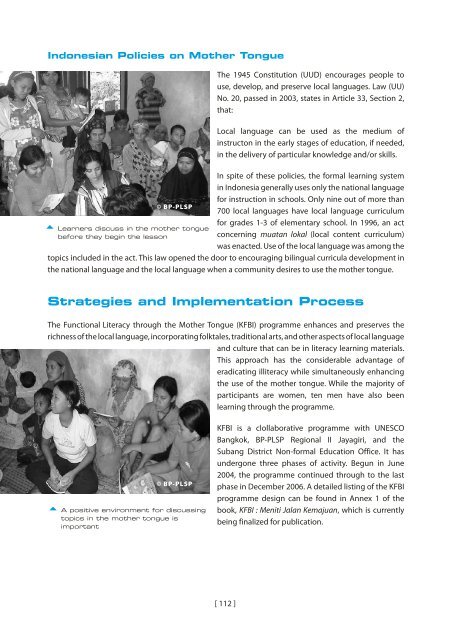Mother Tongue-based Literacy Programmes: Case Studies of Good ...
Mother Tongue-based Literacy Programmes: Case Studies of Good ...
Mother Tongue-based Literacy Programmes: Case Studies of Good ...
You also want an ePaper? Increase the reach of your titles
YUMPU automatically turns print PDFs into web optimized ePapers that Google loves.
Indonesian Policies on <strong>Mother</strong> <strong>Tongue</strong>© BP-PLSP Learners discuss in the mother tonguebefore they begin the lessonThe 1945 Constitution (UUD) encourages people touse, develop, and preserve local languages. Law (UU)No. 20, passed in 2003, states in Article 33, Section 2,that:Local language can be used as the medium <strong>of</strong>instructon in the early stages <strong>of</strong> education, if needed,in the delivery <strong>of</strong> particular knowledge and/or skills.In spite <strong>of</strong> these policies, the formal learning systemin Indonesia generally uses only the national languagefor instruction in schools. Only nine out <strong>of</strong> more than700 local languages have local language curriculumfor grades 1-3 <strong>of</strong> elementary school. In 1996, an actconcerning muatan lokal (local content curriculum)was enacted. Use <strong>of</strong> the local language was among thetopics included in the act. This law opened the door to encouraging bilingual curricula development inthe national language and the local language when a community desires to use the mother tongue.Strategies and Implementation ProcessThe Functional <strong>Literacy</strong> through the <strong>Mother</strong> <strong>Tongue</strong> (KFBI) programme enhances and preserves therichness <strong>of</strong> the local language, incorporating folktales, traditional arts, and other aspects <strong>of</strong> local languageand culture that can be in literacy learning materials.This approach has the considerable advantage <strong>of</strong>eradicating illiteracy while simultaneously enhancingthe use <strong>of</strong> the mother tongue. While the majority <strong>of</strong>participants are women, ten men have also beenlearning through the programme.© BP-PLSPA positive environment for discussingtopics in the mother tongue isimportantKFBI is a clollaborative programme with UNESCOBangkok, BP-PLSP Regional II Jayagiri, and theSubang District Non-formal Education Office. It hasundergone three phases <strong>of</strong> activity. Begun in June2004, the programme continued through to the lastphase in December 2006. A detailed listing <strong>of</strong> the KFBIprogramme design can be found in Annex 1 <strong>of</strong> thebook, KFBI : Meniti Jalan Kemajuan, which is currentlybeing finalized for publication.[ 112 ]

















